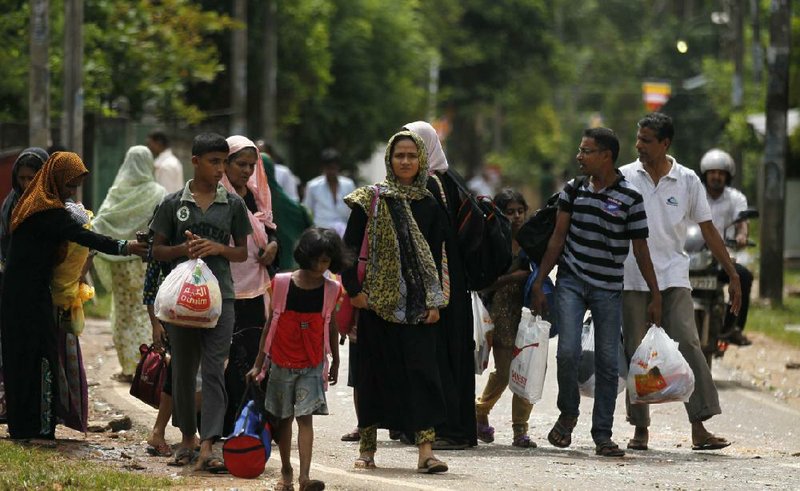ALUTHGAMA, Sri Lanka -- The attackers stormed in about midnight, tearing through town with gasoline bombs and clubs before carting away piles of cash and jewelry they stole from Muslim families in a tiny corner of Sri Lanka.
The onslaught incited by the Bodu Bala Sena, or Buddhist Power Force, a hard-line group that has gained thousands of followers in recent years, killed at least two Muslims and injured dozens more last month in the worst religious violence Sri Lanka has seen in decades.
Now, President Mahinda Rajapaksa's government is under fire, accused of failing to protect Sri Lanka's Muslim minority and allowing radical Buddhists to operate with impunity for years.
Critics of Rajapaksa's government say it has turned a blind eye to the violence as a way to shore up its core constituency -- the Sinhalese Buddhist population, which makes up about 75 percent of Sri Lanka's 20 million people.
"At the root of the failure of the government to check the violence is electoral politics," said Jehan Perera, head of the National Peace Council, a peace activist group in Sri Lanka. "If the Sinhalese voters feel insecure for any reason, they will tend to vote for the present government, which is seen as strong and pro-Sinhalese."
But the recent violence has drawn criticism from inside Sri Lanka, with the media, moderate Buddhists and even the justice minister slamming Rajapaksa for not doing enough to safeguard Muslims.
Foreign embassies and the United Nations also demanded action. The United States canceled a five-year, multiple-entry visa held by the Bodu Bala Sena's general secretary, according to the group's chief executive officer, Dilanta Vithanage.
Facing a growing backlash, the government in recent days has tried to deflate the crisis, though critics say the moves are too little, too late.
The Defense Ministry called a news conference Wednesday -- nearly three weeks after the bloodshed -- to distance itself from the Bodu Bala Sena and to address allegations that Sri Lanka's powerful defense secretary and the president's brother, Gotabhaya Rajapaksa, was quietly supporting the group's cause.
But the military spokesman, Brig. Ruwan Wanigasooriya, was careful not to criticize the group, either. "I am not condemning the BBS," he said.
"What I am saying is it is wrong to say that the secretary of defense is supporting the BBS."
The same day, police interrogated the group's general secretary, the Rev. Galagoda Atte Gnanasara, for five hours before releasing him without charge.
It was the first time Gnanasara had been questioned by police for discriminatory speech, even though it has been widely acknowledged and circulated in videos online for years.
Just hours before the latest violence, video clips showed him inciting crowds in Buddhist rallies that passed through Muslim areas such as Aluthgama and Beruwala.
"Yes, we are racists," Gnanasara shouted. "Yes, we are religious extremists."
That evening, the mob attacked Aluthgama, Beruwala and nearby Darga Nagar, three towns with a large Muslim presence.
In the wake of the raid, Gnanasara acknowledged that his supporters were behind the violence, saying the attackers were angry about an assault on a Buddhist monk. Muslims deny attacking the monk.
Previous attacks by the group have gone unpunished, and hard-line monks for the most part have acted without fear of any legal repercussions.
Sri Lanka is still deeply scarred by its 1983-2009 civil war between the Buddhist Sinhalese majority and ethnic Tamil rebels, who are largely Hindu. During the war, Buddhist-Muslim violence was relatively rare.
But the monks leading Bodu Bala Sena have amassed a significant following in recent years. At raucous rallies, radical monks encourage violence against minority groups and implore Sri Lankans to preserve the purity of the Buddhist majority.
Muslims are a particular target. Members of the Bodu Bala Sena claim Muslims are out to recruit children and marry Buddhist women. They say Muslims are trying to take over the country by increasing their birthrate and secretly sterilizing Buddhists.
Even as the country has seen rising instances of speech against Muslims and attacks on Muslim-owned businesses, there had been few attacks on people.
The June 15 attacks changed that.
The violence has raised fears that Sri Lanka could soon see echoes of Burma, where Buddhist monks helped incite violence in 2012 and 2013 in which Buddhist mobs slaughtered Rohingya Muslims.
But Perera cautioned that for now, the Bodu Bala Sena has relatively limited power.
"In reality this is the violence of a few, to which the government is turning a blind eye," he said. "It is the availability of impunity that drives the violent elements to more violence."
Information for this article was contributed by Bharatha Mallawarachi of The Associated Press.
A Section on 07/06/2014
